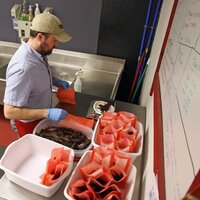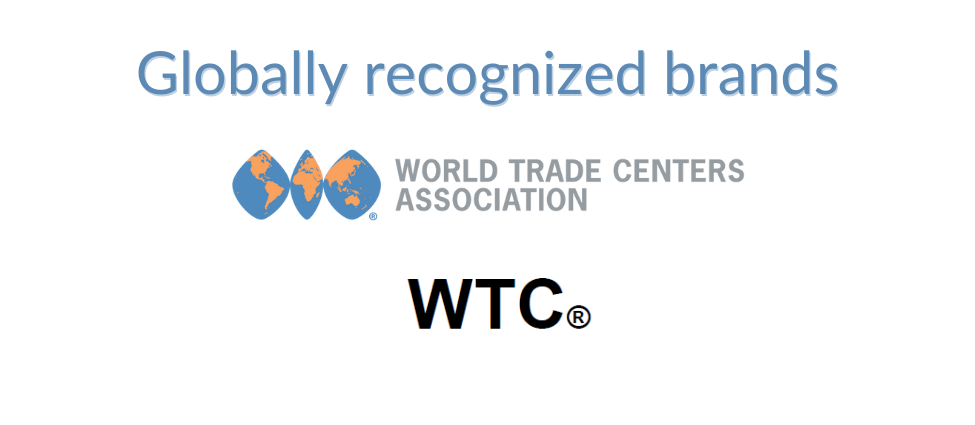
Export program helps local businesses

CHARLESTON, SC, U.S.A. - Export program helps local businesses target international markets.
Melissa Webb never imagined there would be so many hurdles to shipping beef jerky from the Lowcountry to Canada.
“We thought it would be easy exporting to a neighboring country,” said Webb, co-owner and brand strategist for Charleston-based The New Primal, which makes preservative-free beef and turkey jerky. “What we found was that there’s a lot of red tape to jump through, especially with a meat product.”
The New Primal is one of 11 companies that have taken part in export training sessions sponsored by World Trade Center Charleston, a part of the Charleston Metro Chamber of Commerce that provides international business support to local firms. The center will hold its third session for up to six more businesses beginning Feb. 9 at its offices in North Charleston.
The program grew out of an effort by the Brookings Institution in Washington, D.C., to increase exports in key cities nationwide. It offers intensive training in such topics as logistics, legal issues, marketing and finance over four daylong sessions. Most important to many of the program’s participants, however, is the network of experts who are available for guidance long after the last session has ended.
“I now have a Rolodex of knowledgeable people I can call,” Webb said. “The relationships we’ve made have been very valuable.”
Pennie Bingham, the chamber’s senior vice president of business advancement and executive director of the trade center, remembers The New Primal’s optimistic — perhaps too much so — enthusiasm during an initial session.
“They went into this thinking they were going to go to 50 countries like gangbusters,” Bingham said. Domestically, The New Primal sells its products in 2,500 stores nationwide including big-name retailers such as Publix, Bed Bath & Beyond and REI. The company’s owners thought the international market would be just as welcoming.
“What they learned in the training was to be more strategic and to target their efforts,” Bingham said. “So now they are working on two or three countries, and they feel so much better about it.”
Webb said her company hopes to start exporting to Canada at some point this year. There also is a large market for jerky products in New Zealand and Australia, Webb said, adding that The New Primal hopes to target those markets at some point in the future.
Exports equal jobs
The Brookings metropolitan export initiative began in 2012 with four areas — Los Angeles, Minneapolis-St. Paul, Portland, Ore., and Syracuse, N.Y. Charleston was added to the mix, along with eight other cities, the following year and there are now about 28 such programs nationwide.
Business leaders in the Upstate are developing a program for that area.
Working with the institute’s scholars and staff, Charleston and the other cities developed plans for expanding exports to rapidly growing global markets with the goal of diversifying the local economies.
The Brookings Institution was “looking to work with President Obama to increase exports,” Bingham said. “What they realized was that the way to increase exports was not at the national level but at the local level.”
The local plan focuses on using the Port of Charleston to boost exports in homegrown industries such as medicine, automotive and professional services to countries such as China, Germany, Central America and Brazil. The plan also advocates growing this area’s aerospace cluster, with Boeing Co.’s plant in North Charleston the key to attracting a diverse group of suppliers that will sell their products both here and abroad.
And trade center officials agreed that more resources are needed to show local small businesses the potential and benefits of exporting their products and services overseas.
“What we learned from our assessment is that most companies do not know who is there to help them,” Bingham said, adding that there is a range of experts, grants and trade shows available to facilitate exporting. “So our role is to expose that to them and connect them to those resources.”
When the trade center put together its plan, international trade — including activities at the port and at Boeing — accounted for 11.8 percent of this area’s economic activity. Newly released numbers show international trade has increased to 13.5 percent of the overall economy.
“It’s increasing, and a lot of it is because the port is doing so well and Boeing is selling planes and every plane is worth a couple of hundred million dollars,” Bingham said. Brookings “reports that for every billion dollars you can increase sales in exporting, it creates between 5,400 and 6,000 jobs. That’s why we’re doing this. The bottom line of this project is that it creates jobs.”
The export program’s graduates also are having an impact. For example:
The GEL Group, a Charleston-based service provider of environmental testing and analytical laboratory testing, has had $112,372 in international sales thanks to contract work in Canada.
“The export program really increased our focus at GEL on exporting and its benefits to our business,” said Mac Hodgson, the company’s vice president. In addition to the work in Canada, “we were introduced to a consultant that we’ve hired to help us with opportunities in the United Kingdom.”
The company also has had nearly $17,000 in sales to France.
Hanahan-based electronics manufacturer UEC Electronics has a $2 million deal expected to close in the first quarter to provide a hybrid solar and battery-powered system — called Ground Renewable Expeditionary Energy System, or GREENS – to the U.S. military in Germany for use in Africa and the United Arab Emirates. The company also has established trade relations with Indonesia, Singapore, Thailand, Australia, the United Kingdom, Denmark, Israel and Italy.
Mount Pleasant-based USCOA, which makes decorative entrance mats in St. George, has had $2,491 in international sales.
Bonding experience
Each of the businesses that participate in the chamber’s program develop an export plan that can be used immediately and receive one-on-one coaching from experts at the U.S. Commercial Service, the international trade promotion arm of the U.S. Department of Commerce.
The chamber also partners with the College of Charleston, which provides research interns through its international business program.
“Those interns go to the different countries to see if a product is sellable there,” Bingham said. “They go to look at what’s happening around the world based on demand and all kinds of other activities, too. So the businesses now have a research partner as well.”
With a maximum of six businesses participating in each four-class session, the training can be customized for the type of products or services each participant offers.
“And those six companies end up bonding and supporting each other,” Bingham said. “They are giving each other gui- dance. They start sharing marketing ideas with each other.”
The export initiative will run through 2020, at which time Bingham said she hopes 100 local businesses will have participated and learned how to export their products or services.
“That is really going to make Charleston an export economy,” said Laura Bright, the chamber’s vice president of marketing.
Mark Matthews took over as UEC’s chief executive just a couple of weeks ago, but already he’s seeing the benefits of that company’s participation in the export program. In addition to the GREENS program, UEC is working on an export opportunity in Australia, he said, opening new markets for the company’s products.
“It was an intimidating task trying to put together an export plan,” Matthews said, adding that the trade center has been beneficial in providing experts and advice. “We’re really starting to get some traction now.”
To learn more about WTC Charleston, click on the source link below:
